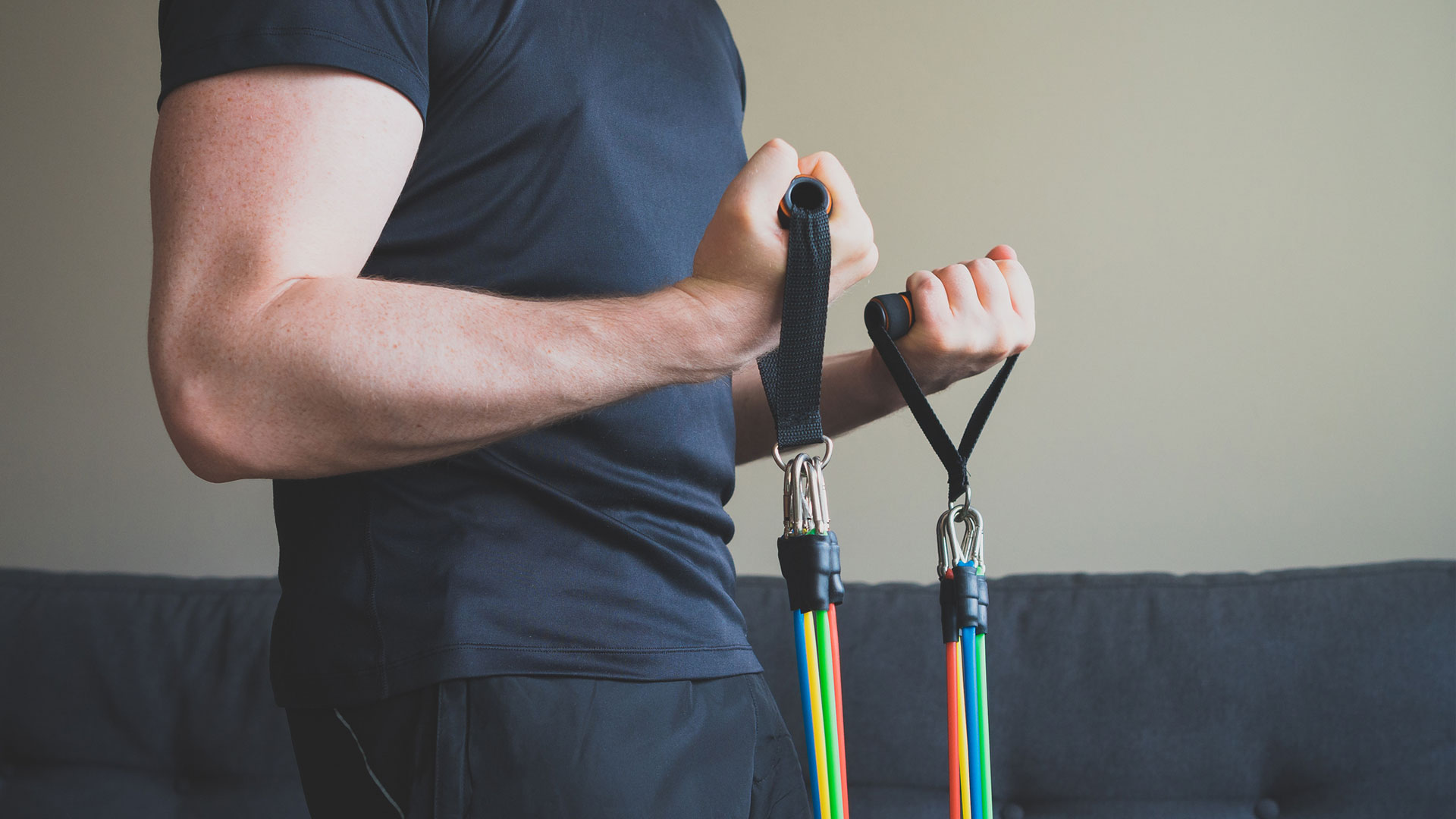Do resistance bands really work?
What exactly are resistance bands, and do resistance bands work? We explore the benefits of these highly effective and affordable fitness aids

They can be a great way to keep fit, but do resistance bands work? Physical activity is one of the most effective ways to stay healthy, support your immune system and mental health, and improve sleep quality.
The US Department of Health recommends that adults perform "150 minutes to 300 minutes a week of moderate-intensity or 75 minutes to 150 minutes a week of vigorous-intensity aerobic physical activity". These moderate-intensity recommendations cover activities such as walking, swimming, and performing yard work, and vigorous-intensity activities include jogging, jumping rope, and High-Intensity Interval Training (HIIT).
The USDA also recommends performing "muscle-strengthening activities of moderate or greater intensity and that involve all major muscle groups on 2 or more days a week", which can include lifting weights, doing bodyweight workouts such as pull-ups, push-ups, and planks, or working out with resistance bands.
Resistance bands are often recommended as a convenient, inexpensive, and versatile option to perform resistance training and mix up aerobic exercise. But what exactly are resistance bands, and do resistance bands work? Read on to find out.
What are resistance bands?
Resistance bands are elastic strips of rubber that are used to provide resistance to the body when exercising. They come in long and short loops (like big elastic bands) and also as single strips, and each kind has a distinct use.

Because they are elastic, the exact resistance they provide increases as you stretch them, so each individual band has a spectrum of resistance levels. Thanks to their variable resistance, individual bands can be used for a range of exercises. They can also suit all abilities, as beginners can use lighter bands, and more experienced gym-goers can opt for a heavier resistance band.
They are lightweight and inexpensive compared to most exercise equipment, are highly portable, and provide some of the best value for money in the exercise equipment industry.
Sign up to get the BEST of Tom's Guide direct to your inbox.
Get instant access to breaking news, the hottest reviews, great deals and helpful tips.
Do resistance bands work?
To answer this question, we need to look at what we are using resistance bands for, and what do we want them to do. Let’s have a look at some of their intended purposes.
Building strength

Strength is simply the ability to lift or move something very heavy. Resistance training, in general, improves your strength by exposing your muscles, joints and bones to gradually increasing levels of resistance. As such, the various tissues in your body respond to this by getting stronger and more resilient.
A study from the European journal of Translational Myology showed that resistance bands do work effectively for building muscle.
Resistance bands accommodate this increasing resistance in two different ways. Firstly, a band can provide greater resistance by being stretched more, just like an elastic band would. Secondly, resistance bands come in a variety of resistance levels, spanning from 10lb all the way up to 200lb — the 'heavier' bands will be harder to stretch, working your muscles harder.
Building muscle and toning

Building muscle and toning are actually the same thing. Whether it looks like you’ve built a large amount of muscle or toned your muscle is simply a factor of how much muscle you gain. Whether it’s for the health benefits that building muscle provides, or the aesthetics, both are extremely common goals for many people embarking on an exercise routine.
Resistance bands can certainly help you build muscle. Not only can they provide adequate resistance during exercises, but they can also provide progressively more resistance over time to regularly challenge the muscles. A 2019 study from the European journal of Translational Myology was able to show that resistance bands do work effectively for building muscle.
Fat loss
When it comes to fat loss, the key factor is energy balance: if you are expending more calories through activity than you are ingesting through food and drink, then you will lose weight and fat. While the most important variable for fat loss will be altering your diet and habits, exercise also plays a vital role in fat loss.
Resistance training will build muscle, which increases the number of calories your body burns throughout the day, even when you’re resting. Exercise will also push the food you eat more towards fueling and recovering your muscles, rather than being stored as fat, a concept called nutrient partitioning.
Finally, and perhaps most obviously, exercise burns calories. Using resistance bands increases the resistance on the body, leading to a higher level of effort, and more energy and calories being burned. As long as your diet is balanced, resistance bands can definitely work to assist with fat loss.
Rehabilitation
Resistance bands are often used in injury rehabilitation because of their variable load. When first beginning a rehabilitation program, the given muscle or joint may be weak. Using resistance bands can help strengthen the muscle or joint.
That said, if you are nursing an injury, we would always recommend checking with a doctor before embarking on a new training program.
Do resistance bands work: Verdict

In a word, yes. As you can see from this list, resistance bands work for a variety of different purposes, goals, and fitness levels. Regardless of where you are now, or where you’d like to be, resistance bands can be an excellent addition to your exercise routine.
If you're looking for the best resistance bands to add to your home workouts, we've found them. For more inspiration check out these resistance band leg exercises suitable for beginners, the resistance band arm exercises that build muscle without weights, and how to squat and deadlift with a resistance band.
Will McAuley is a London-based Personal Trainer and Nutrition Coach who’s writing has appeared in Men’s Fitness and GQ magazine, covering exercise, nutrition and health. He has a Master’s degree in Strength & Conditioning from Middlesex University in London, is a published scientific author in the Journal of Strength and Conditioning Research, and holds a Bachelor’s degree in Linguistics from Trinity College Dublin.
